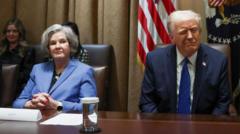The decision underlines that only Congress possesses the authority to govern trade, curtailing the presidential power previously assumed by the administration.
**US Court Invalidates Trump’s Tariffs: Major Setback for Trade Policies**

**US Court Invalidates Trump’s Tariffs: Major Setback for Trade Policies**
A landmark ruling by a US federal court has overturned President Trump's extensive tariffs, critically affecting his administration's economic objectives.
In a significant legal development, a US federal court has overturned President Donald Trump's extensive tariffs, delivering a considerable blow to one of his economic cornerstones. The Court of International Trade determined that the emergency statute relied upon by the administration does not confer on the president the authority to impose tariffs across almost all nations.
The court, located in Manhattan, emphasized that the US Constitution grants Congress exclusive rights to regulate commerce with countries, which cannot be bypassed by the president's economic strategies. Following the ruling, the Trump administration promptly filed an appeal against the court's decision. Simultaneously, the court annulled separate tariffs that the president had introduced on China, Mexico, and Canada, which were justified as a response to the influx of illegal drugs and immigration into the United States.
White House deputy press secretary Kush Desai objected to the ruling, asserting that the responsibility of addressing a national crisis should not fall to "unelected judges." "President Trump has committed to putting America first and will fully utilize executive power to tackle this issue," he stated.
The legal challenge was initiated by the Liberty Justice Center, representing five small businesses affected by the new tariffs, marking a significant action against the administration's "Liberation Day" tariffs. Attorney General Letitia James of New York, one of the twelve states that backed the lawsuit, praised the ruling, stating, "No president has the unilateral power to impose taxes at will."
The ongoing legal battles against Trump’s trade policies now consist of seven challenges, with a combination of claims from thirteen US states and numerous small businesses. In the court's decision, a panel of three judges noted that the International Emergency Economic Powers Act (IEEPA)—a law from 1977 that the president used to assert the tariffs—did not authorize him to execute such broad measures.
As a result of the ruling, global financial markets have experienced significant fluctuations since Trump announced the tariffs on April 2. Following the latest developments, Asian stock indices, including Japan's Nikkei 225, witnessed notable increases, and US stock futures surged. Additionally, the dollar strengthened against traditionally safer currencies like the Japanese yen and Swiss franc, signaling investor optimism after the court's decision.
The court, located in Manhattan, emphasized that the US Constitution grants Congress exclusive rights to regulate commerce with countries, which cannot be bypassed by the president's economic strategies. Following the ruling, the Trump administration promptly filed an appeal against the court's decision. Simultaneously, the court annulled separate tariffs that the president had introduced on China, Mexico, and Canada, which were justified as a response to the influx of illegal drugs and immigration into the United States.
White House deputy press secretary Kush Desai objected to the ruling, asserting that the responsibility of addressing a national crisis should not fall to "unelected judges." "President Trump has committed to putting America first and will fully utilize executive power to tackle this issue," he stated.
The legal challenge was initiated by the Liberty Justice Center, representing five small businesses affected by the new tariffs, marking a significant action against the administration's "Liberation Day" tariffs. Attorney General Letitia James of New York, one of the twelve states that backed the lawsuit, praised the ruling, stating, "No president has the unilateral power to impose taxes at will."
The ongoing legal battles against Trump’s trade policies now consist of seven challenges, with a combination of claims from thirteen US states and numerous small businesses. In the court's decision, a panel of three judges noted that the International Emergency Economic Powers Act (IEEPA)—a law from 1977 that the president used to assert the tariffs—did not authorize him to execute such broad measures.
As a result of the ruling, global financial markets have experienced significant fluctuations since Trump announced the tariffs on April 2. Following the latest developments, Asian stock indices, including Japan's Nikkei 225, witnessed notable increases, and US stock futures surged. Additionally, the dollar strengthened against traditionally safer currencies like the Japanese yen and Swiss franc, signaling investor optimism after the court's decision.




















